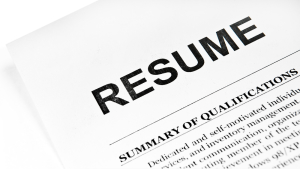Resumes and Interviews
The job of anyone interviewing is to paint the best possible picture of themselves to you, the interviewer. I read a statistic recently, and no, I don’t remember where, that said 50% of all resumes have something on them that is not accurate. It might even be an out-and-out lie. Having spent 20 years as a recruiter, I know this to be a fact. It might be a gap in employment that isn’t reflected or a degree they don’t have. Remember where I started this paragraph, they want you to make them an offer. They may have been told everyone stretches the truth. Many believe that the information they put on their resume isn’t verified, and they aren’t wrong.
If we start with the premise that many resumes aren’t accurate, the logical next thought is that the things they say in the interview aren’t truthful. Is there any way to distinguish the truth from fiction so that you can make good hiring decisions? We will discuss interviewing techniques to help you sift through the BS on the resume and what they say during the interview.
Sifting through the BS on resumes
A resume can help you spot potential for success, or predict they will be a miserable failure.
A couple of tips on things to look for on the resume:
- Do they have a section outlining their accomplishment? Or do you see words such as “worked as”, “was responsible for”, “helped”…words that indicate they individually didn’t make a contribution?
- Functional resume versus chronological. If the resume just lists what they have done functionally, but doesn’t show companies they worked for and dates be careful. Not only do you have no way of knowing their tenure at places, you can’t tell their career progression or anything else.
- Lists and lists of educational classes or courses they have taken. Who cares! This just says they don’t have much in the way of experience and are trying to say they have courses to prove they can do the job.
- Buzz words, but you can’t see the experience in the resume. For example, if you are hiring a software developer who lists tons of software at the top, but you can’t see where they used it in their work.
Sifting through the BS in interviews
Your job as the interviewer is to learn as much as you can about the person’s skills, experience and background. It’s also to get to know who they are as a person, as this is a much better indication of what you can expect of them than experience or skills.
So how do you do that when you know they want to impress you? Here are some tips on interviewing.
- Don’t ask the standard interview questions everyone asks. They will be prepared for those.
- Ask unexpected questions, such as:
- Tell me about a time in your life you consider a failure. Why was it so and what, if anything, has changed as a result? Or tell me about a time when you tried to do something and failed.
- If they tell you they never failed at anything you’ve got a problem.
- Is it a professional situation, not getting into the college of their choice, something personal? It tells you what’s important to them.
- Do you have any examples of when you had way too much to do, and deadlines to meet and you weren’t going to be able to get it all done? How did you handle this? Or how do they deal with competing yet equally important priorities?
- you’re trying to determine how they manage competing priorities.
- Are they able and willing to ask for help?
- Tell me about a time in your life you consider a failure. Why was it so and what, if anything, has changed as a result? Or tell me about a time when you tried to do something and failed.
- Ask the same question a couple different ways at different times in the interview. Are their answers consistent?
There is no guarantee that you won’t make hiring mistakes even following these interviewing techniques. I interviewed over 300 people a year while I was a recruiter, that’s over 60,000 people, and occasionally I was fooled. However, if you don’t let the bright smile, the sparkling personality, or even your need to hire overshadow digging deep to learn about the person, you’ll consistently make better hiring decisions.
Struggling with what questions to ask during an interview so you REALLY get to know the candidate? Find all the answers in The Language of Interviewing. In less than 60 minutes you will know what to ask to cut through the fluff, get behind the resume, and gain clarity on whether the candidate is the right person for the job.







